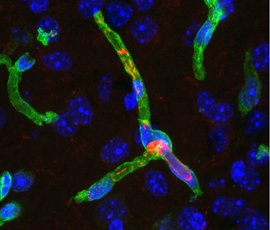
Cerebral capillary of an ANXA1 null mouse
The blood-brain barrier (BBB) is a layer of cells, including endothelial cells, which line the blood vessels in the brain and spinal cord. These cells act as a barrier, stopping certain molecules, including immune cells and viruses, passing from the blood stream into the central nervous system (brain and spinal cord).
In a number of neurodegenerative brain diseases, including MS, the BBB is compromised, allowing inappropriate cells to pass into the brain with devastating consequences.
In this study the researchers identified a specific protein – known as Annexin A1 (ANXA1) – as being integral in maintaining the BBB in the brain. The authors initially found that mice bred to lack this protein showed a decrease in integrity of the BBB compared to controls.
Taking this finding, they then investigated the potential role of ANXA1 in conditions which involve progressive breakdown of the BBB, including MS and Parkinson’s disease, by examining post-mortem human brain tissue samples. ANXA1 was present in the cells of samples from individuals who did not have a neurological disease and also in samples from patients who had died with Parkinson’s disease. However, it was not detectable in the endothelial cells in samples from patients who had died with MS.
Crucially, the researchers found that treating in vitro brain endothelial cells with human recombinant ANXA1 restored the key cellular features needed to reinstate the integrity of the BBB. The same was seen with the ANXA1 knockout mice, where administering the protein reversed the permeability of the BBB within 24 hours.
Dr Egle Solito, from Barts and The London School of Medicine and Dentistry, part of Queen Mary, who co-ordinated the study said: “Our findings suggest this protein plays a key role in maintaining a functioning BBB and, more importantly, has the potential to rescue defects in the BBB. We now need to carry on our research to see how much this molecule may be exploited for therapeutic uses in conditions such as MS, or as a biomarker to help in early diagnosis.”



